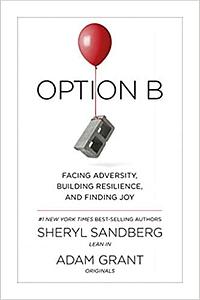Take a photo of a barcode or cover
I just kept thinking: What about an Option B for introverts? I learned about the 3 Ps, which I found to be a useful concept, but so much of Sandberg's book is about friends and family supporting her, finding a place and comfort with groups of people. What about introverts, the social anxious or avoidance? Still, useful and interesting ideas in many ways.
I’d actually rate this book a 3.5 stars. I’m not a widow, but I have lost a child. She tells her story with candor and examples of how her life changed. It did seem a bit disjointed at times and I had a tough time connecting some of the other stories to her own. Tragedies do have some common threads, but they came across as very loose threads in this book. Still, her story was worth listening to and wisdom can be gleaned from her writing.
3.5 stars. I liked it and think it’s a worthwhile read. Nothing too earth shattering, especially considering that my faith and culture already emphasize finding joy in struggles and purpose and growth in challenges.
Although I am not currently grieving a loss, I felt like this book gave some helpful tips on resilience and coping that can be applied to other areas of life. However, there are some ways in which being a well-connected millionaire with a giant circle of friends prevents you from connecting to the more common person.
A very honest and thoughtful look at grief and trauma. I highly recommend this book.
Worth a read
This book is well written. The stories they share are well connected to the theme of the book. I think the recommendations are spot on for grief. This idea that grief is a linear process is silly, so I’m glad the authors debunked that. Although I have not lost a spouse or children, I think I can take much of what I read and apply it anyway. If nothing else, this book taught me something new and got me thinking.
This book is well written. The stories they share are well connected to the theme of the book. I think the recommendations are spot on for grief. This idea that grief is a linear process is silly, so I’m glad the authors debunked that. Although I have not lost a spouse or children, I think I can take much of what I read and apply it anyway. If nothing else, this book taught me something new and got me thinking.
Helpful and encouraging look at how to grieve and work through your options when life doesn’t turn out the way you expected/planned/hoped.
This is a great book to read if you are in any stage of the grieving process, no matter what you might be grieving. Here, Sandberg lays bare her own wounds and heartache and pain and talks about the steps she had to take to get through them. And I also liked how aware she is of her own privilege and points out that not everyone has the luxury that she had.
This is a book that I found useful for my own grieving process and one that I’ll be sure to recommend to others who are also dealing with grief and loss. I appreciated her insights and deep wisdom and her empathy shone through so strongly. I loved this book and I feel so sad for her loss. I found myself wanting to hug her and let her know how much I was hurting for her. This was the perfect book to read on a rainy day when you can’t get out and do anything.
This is a book that I found useful for my own grieving process and one that I’ll be sure to recommend to others who are also dealing with grief and loss. I appreciated her insights and deep wisdom and her empathy shone through so strongly. I loved this book and I feel so sad for her loss. I found myself wanting to hug her and let her know how much I was hurting for her. This was the perfect book to read on a rainy day when you can’t get out and do anything.
Probably a 3.5, but it exceeded my low expectations, so it gets a bump! I definitely had issues with Lean In, but she seems to acknowledge those problems (i.e. not acknowledging her privilege) in this book. This book also reads more like a pop psyc book than anything else (but no in-text citations or footnotes! why no footnotes!) and was very insightful on grief.
I picked this book up at Goodwill like a year ago and then didn't read it because I thought I might not like it. And it did have some of the features I expected from a Sheryl Sandberg book -- personal memoir pieces interspersed with the summaries of random studies, some of which felt only tangentially related to the memoir pieces; repeated acknowledgement of the author and her family's privilege in a sort of direct, on-the-nose way. But I didn't really mind, because the thing I'm always looking for in a grief memoir is for something I recognize -- an experience that reminds me of my own -- and parts of this book did in fact do that.



